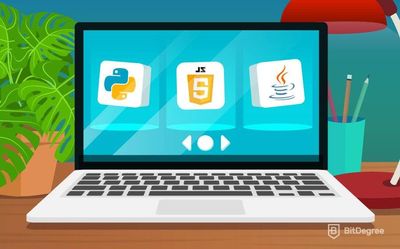People might feel conflicted about how to learn Python in a timely manner. However, the learning process might differ depending on you current skills. For instance, if you have some decent knowledge about other programming languages, Python won’t be challenging to crack.
Of course, people are looking for the best ways to learn Python, meaning they do not want to wander around or work on pointless tasks. While some of the recommendations might be individual, there are some general tips that you can follow to understand how to learn Python fast. If you're curious to learn about specific courses to get you started with Python, check out our guide to the best DataCamp Python courses here.
Table of Contents
- 1. Overview of Python: How to Learn Python and Why?
- 2. Start from the Basics
- 3. Find a friendly IDE
- 4. Find resources to follow
- 5. Define your goals
- 5.1. Python for data analysis
- 5.2. Web development and Python
- 5.3. Teaching machines with Python
- 5.4. Other purposes
- 6. Write code. Daily
- 7. Work on projects
- 8. Explore libraries
- 9. Learn from specialists
- 10. Do not forget the supportive community
- 11. Stay motivated!
- 12. Last thoughts: how fast can you learn Python?
Overview of Python: How to Learn Python and Why?
Nobody could deny the fact that the popularity of Python has skyrocketed. Due to the increased interest in machine learning, artificial intelligence, and data science, Python has become the language of the hour. The simple syntax of this programming language also contributes to the craze of wanting to find out how to learn Python. However, newbies should really follow a methodological approach when learning to work with any programming language.
Latest EXCLUSIVE 25% OFF Coupon Found:
EXCLUSIVE 25% OFF
On DataCamp Subscriptions
Follow the Datacamp promo code link & get an exclusive 25% OFF Datacamp subscriptions. Act now while the offer is still available!

- By definition, Python is a general-purpose language that produces a relatively readable code thanks to its elegant and straightforward syntax. Specialists categorize Python as a high-level language, meaning that it is closer to the standard human languages. Therefore, Python has a smoother learning curve when compared to low-level languages like C++.
- Since Python is a general-purpose language, it can produce code for various projects: web applications, games, system administration tools, data analysis, scraping, machine learning, etc.
- The question of how fast can you learn Python depends on your goals as well. For instance, comfortably using Python to write simple programs won’t take long. However, one of the most robust features of Python is the number of companions it has. By companions, I mean libraries that are here to expand the possibilities of the standard Python coding.
- Libraries are highly beneficial to various Python projects, mostly in terms of reducing the number of code lines programmers need to produce manually. Therefore, your Python projects might consist of the code you wrote, but the majority of lines can come from libraries.
- The general rule on how to learn Python is that you need to learn the basics of the language before you go deeper into the libraries.
We've got various guides on Python, ranging from the very basics to its application in machine learning that you can check out. However, for now, let's take a look at what the best learning practices are.
Start from the Basics
The first step toward learning is the most important. If you choose an overly challenging path, you will feel discouraged to continue. Therefore, mastering the basics is among the best ways to learn Python.

Object-oriented programming (OOP) is on top of your list. This concept refers to a specific style of programming. In other words, it strongly influences the construction of software. In OOP, everything is based on objects, and developers enclose information and behavior into them. An opposite approach would be procedural programming (PP), which means that programmers produce lists of actions for computers to follow step-by-step.
Python supports the OOP, meaning that you will be able to use such things as classes and objects. Beginners have stated that learning OOP principles was the most demanding task. However, with enough practice, the concepts will sink in faster.
Find a friendly IDE
You should choose an IDE very early in the game. By using an integrated development environment, you will produce and debug code much more efficiently. Here is a list of IDE’s that you are welcome to choose from PyCharm, Spyder, Sublime Text 3, Visual Studio Code, and Atom. For a more comprehensive review of the available IDE’s, check out this tutorial.
Find resources to follow
What do you need to learn Python besides a friendly IDE? Well, you need to find useful resources to study from. Here are some of the reputable sources to consider:

- Official Python documentation. Most programming languages have their documentations, explaining their use and principles. Python is following the same trend and offers detailed explanations on the installation of Python modules and the basic uses. This page provides an easy-to-follow outline, reassuring that you will learn from the basics to advanced stuff. Check this viable source to learn from the people that are responsible for keeping Python stable and enjoyable to use!
- You can become a student in a coding school. Nowadays, they are prevalent among people who wish to learn to program but require some professional guidance. However, such schools require you to follow a schedule, show up for classes, and meet deadlines. For people wanting to make a career change, this option might be too time-consuming. However, if you have some free time, look for coding schools near you!
- Students are welcome to try tutorials. For instance, our platform offers this page for Python programming rookies. In these short and to-the-point tutorials, you will find theory powered by useful code examples. The best part is that you can use our code editor to work on our code examples and save them for later reference. DataCamp also offers its users free resources and cheat sheets that feature the essentials of Python.
Define your goals
Even though you are asking how to learn Python, you should consider asking why instead of how. Of course, Python is a general-purpose language, meaning that it will serve you in various ways. However, I recommend you figure out whether Python has the means to fulfill your goal. What are the most popular use cases of Python? Let’s take a look.
Python for data analysis

Data science is a broad term. It can refer to a variety of actions such as analysis of datasets, visualization of information, extraction valuable insights about the industry, and the overall organization of data. Due to the simple syntax of Python, this language is a fair game for all. Therefore, the majority of people that are looking for how to learn Python fast are not even programmers but data analysts, business owners, marketing specialists, etc. Anyone can benefit from proper data analysis. The trends you discover might change your business strategy.
Web development and Python
While PHP is the most popular language for the back-end development of websites, Python is no stranger to this process. You can use this programming language to write the server-side logic for your web application. According to JetBrains, 46% of people using Python apply it for web development purposes. In fact, 49% use Python for data analysis. Therefore, the statistics indicate a minimal difference.
Teaching machines with Python
Machine learning is a field closely related to artificial intelligence. Currently, these two fields are taking the spotlight from other areas. Of course, AI is a promising field, and if you are willing to put in the work, it is worth a try. Python is the language for machine learning due to several reasons. First of all, this programming language has a simple syntax, an extensive list of libraries, and support from its community.
Want to learn more about libraries? Check this tutorial. Additionally, check out our DataCamp guide that explores the Machine Learning Fundamentals with Python skill track, as well as other highly-recommended Python courses.

Did you know?
Have you ever wondered which online learning platforms are the best for your career?

- Easy to use with a learn-by-doing approach
- Offers quality content
- Gamified in-browser coding experience
- Free certificates of completion
- Focused on data science skills
- Flexible learning timetable

- High-quality courses
- Nanodegree programs
- Student Career services
- Nanodegree programs
- Suitable for enterprises
- Paid certificates of completion

- A wide range of learning programs
- University-level courses
- Easy to navigate
- University-level courses
- Suitable for enterprises
- Verified certificates of completion
Other purposes
Python can also be used for projects related to system administration, automation of scripts, infrastructure configuration, web parsers, software testing, software prototyping, game development, and so much more!
Therefore, you can choose from a multitude of available options and start learning! A more elaborate explanation of the Python use cases can be found here.
Write code. Daily

How to learn Python and produce functional applications? Well, you cannot go wrong with regular practice. That is the key, opening doors to a higher salary and more job opportunities. If you want to become the best programmer possible, you need to practice daily.
Together with that, professionals are always keeping up with the newest trends to improve their code. You too, as a beginner, should prepare yourself for a long-term journey to becoming a programmer. While you can master the basics in a month or two, you will need more time to produce more complex programs.
Work on projects
What do you need to learn Python returns to the fact that you should apply the theory. The easiest way to learn anything is to use it. For instance, you can learn the grammatical rules and principles of a language, but you cannot master it until you attempt to speak or write in it. Therefore, you should start pursuing projects every early on.
However, rookies might feel lost when it comes to picking beginner-friendly projects. For this purpose, we devised this article, helping you choose the best training possible.
Explore libraries
How fast can you learn Python depends on your skills and the way you understand learning. For some, it might be enough to use the standard Python library. However, in most cases, people quickly start exploring the Python libraries when the standard no longer satisfies their growing needs.

I am going to review several Python libraries to give you basic knowledge about them. Please remember that you should not rush to the libraries. Before that, work with vanilla Python. After becoming familiar with concepts of this programming language, you can be resourceful and look for additional features to incorporate into your programs.
- Django is an open-source framework. It helps developers to work on the back-end of web applications. Django is all about code being simple, easy-to-read, flexible, and scalable.
- TensorFlow is an artificial intelligence library, allowing developers to create large-scale neural networks.
- Flask is another useful source for developing web applications.
- Scikit-learn is a framework for producing applications based on machine learning.
- Keras is an open-source library, helping people experiment with neural networks.
- NumPy is the source to help you perform scientific computing with Python.
Learn from specialists
Professionals are the ones that have the foundation of knowledge you want to build. Besides the basic principles, Python specialists can reveal tips and tricks that are little-known to the broad public. However, how to learn Python from skilled people? It sounds expensive, right? But it does not have to be out of your price range.
Online courses are popular ways of learning. Instead of looking for schools specializing in one or another topic, you can learn from professionals at a reasonable price. Take a look at this list of online courses taught by skilled instructors:

- This course on Python basics discusses everything you need to know to get started. The instructor will cover variables, functions, lists, loops, sets, dictionaries, classes, importing, etc. Furthermore, this course is project-based, meaning that you will also work on making a blackjack game.
- In this course, you can find the principles of using Python for web development. You will learn how to access and parse the web, manage databases, and remote servers. You will be using the Flask framework as well.
- If you wish to use Python for data science, this course will perfectly cover the use of NumPy and Pandas for analyzing and visualizing data.
- Do you want to apply Python for making predictions in the stock market? This course discusses the role of AI in this field.
- If you are not familiar with OOP, we have a guide for you as well. Learn more about this paradigm and prepare yourself for Python programming.
- If you are looking for that project-based edge, try this course, providing step-by-step instructions for building a hotel website.
- Another project idea for you is to build a bot. Follow this guide and learn how to use Python to build a Telegram bot.
Do not forget the supportive community
Python has a great support system from all around the world. There are many platforms popular among programmers. Such forums are usually beneficial to beginners, especially if they have questions about their code.
Table: Learning process on DataCamp VS BitDegree
So, you wonder how to learn Python fast? Do not live in a bubble. Do not be afraid to become a part of the Python community. They will help you improve and become a better programmer!
Stay motivated!
Learning is a long process, and sometimes people start to think that their efforts are fruitless. Do not let these thoughts discourage you from continuing your studies. Knowing Python will improve your resume and make you a stronger candidate for a variety of positions.
Since Python is a versatile language, it will be useful in various job openings. To stay motivated, think about the projects that you will be able to pursue after learning Python.
Last thoughts: how fast can you learn Python?
You should not have expectations regarding the time you will need to learn Python. In the majority of these cases, you won’t meet the deadline you have set. Therefore, give yourself the freedom to learn for as long as you need. After all, Rome was not built in a day. To achieve great things, you need to dedicate a lot of time and effort. However, it is an investment worth making.












